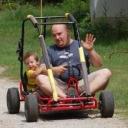Yahoo Answers is shutting down on May 4th, 2021 (Eastern Time) and beginning April 20th, 2021 (Eastern Time) the Yahoo Answers website will be in read-only mode. There will be no changes to other Yahoo properties or services, or your Yahoo account. You can find more information about the Yahoo Answers shutdown and how to download your data on this help page.
Trending News
dodge man i need help?
every time i turn my 05 dodge dakota 4.7 on after its been sitting fro a while you can here noticeable lifter noise. as soon as it warms up its gone. also the oil light will turn on but will go off as soon as i turn the car on and off again. im thinking its the oil pump failing. and you can here a noticeable whine at speeds when you even out the speed. i just dont get the truck everything just seems to keep failing.
also at cold start the car will jump up to 1500 rpm but then drop almost instantly to 600-700 rpm. that should not happen when its -20-30C should it not idle at a higher rpm to warm up the engine?
2 Answers
- Kevin KLv 57 years agoFavorite Answer
From my understanding the lifter noise when cold is normal. My 04 Durango does it, and i asked around and got that answer. I started noticing the noise in other Dodge vehicles when starting up cold.
As long as the vehicle is idling normal and not rough, it shouldn't have to stay at 1500 rpm,
- 7 years ago
The engine computer will control the start-up RPM, idling at 1500 was "carburetor" cold start RPM. All our ECM controlled vehicles ('97 V6 Dakota, '04 4.7 Dakota, '00 3.3 Grand Voyager SE, and '05 2.4 Stratus) idle about 700 regardless of outside air temperature.
The oil light should go off and stay off when oil pressure exceeds the minimum pressure preset in the oil pressure sending unit, it should not be necessary to shut down and restart the engine. I'm inclined to think you have a sending unit problem rather than a failing oil pump. One way to analyze the problem is to hook up a mechanical oil pressure gauge directly to the engine block and check pressure readings on start-up and at various RPMs.
Source(s): Fifty years of shadetree engineering, racing, and home auto repair, all Mopars mostly Dodges.



